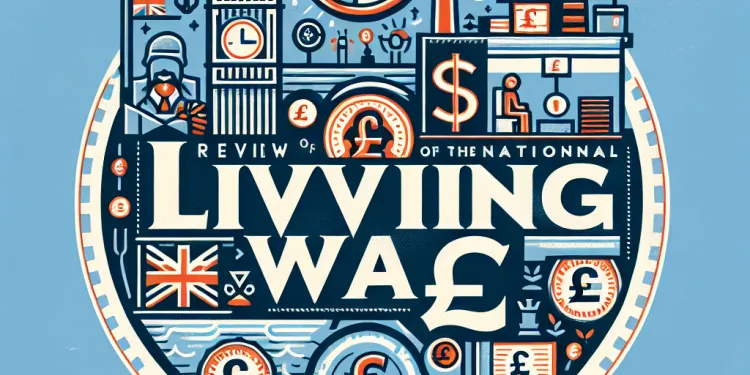
Find Help
More Items From Ergsy search
-

Is the Living Wage Foundation's rate the same as the National Living Wage?
Relevance: 100%
-

Who is eligible for the National Living Wage?
Relevance: 98%
-

Why is the National Living Wage being increased?
Relevance: 97%
-

UK national living wage increase 2026
Relevance: 97%
-

How is the National Living Wage calculated?
Relevance: 97%
-

Are apprentices entitled to the National Living Wage?
Relevance: 97%
-

How does the National Living Wage differ from the National Minimum Wage?
Relevance: 96%
-

What is the new UK National Living Wage for 2026?
Relevance: 94%
-

How often is the National Living Wage reviewed?
Relevance: 94%
-

Will the increase in the National Living Wage affect inflation?
Relevance: 91%
-

Are employers legally required to pay the National Living Wage?
Relevance: 91%
-

How does the UK National Living Wage compare internationally?
Relevance: 90%
-

Are zero-hour contract workers entitled to the National Living Wage?
Relevance: 90%
-

Where can I find official announcements on the National Living Wage?
Relevance: 88%
-

What happens if an employer pays below the National Living Wage?
Relevance: 85%
-

How can I calculate my new earnings based on the National Living Wage increase?
Relevance: 83%
-

Does the National Living Wage increase mean my taxes will change?
Relevance: 61%
-

How often do wage rates change in the UK?
Relevance: 60%
-

When will the new National Living Wage come into effect?
Relevance: 44%
-

Do gig workers have the right to a minimum wage?
Relevance: 40%
-

Can my wages be garnished for unpaid student loans?
Relevance: 39%
-

What should I do if my employer does not pay the new National Living Wage?
Relevance: 39%
-

How does the National Living Wage increase impact small businesses?
Relevance: 39%
-

What is the National Trust?
Relevance: 33%
-

Do I need to pay tax on the £500 cost of living payment?
Relevance: 33%
-

What are National Trust Jobs?
Relevance: 32%
-

Are there seasonal jobs with the National Trust?
Relevance: 31%
-

Does the National Trust offer internships?
Relevance: 30%
-

Can I work for the National Trust part-time?
Relevance: 30%
-

What if I have gaps in my National Insurance record?
Relevance: 30%
-

Is there a change in National Insurance rates for 2026?
Relevance: 30%
-

Do National Trust jobs require travel?
Relevance: 30%
-

Impact of Cost of Living on UK Communities
Relevance: 29%
-

Navigating the UK Cost of Living Crisis: Tips for Families
Relevance: 29%
-

What types of positions are available at the National Trust?
Relevance: 29%
-

Can I get a job with the National Trust if I am a student?
Relevance: 29%
-

Is the £500 cost of living payment taxable?
Relevance: 29%
-

Is the basic State Pension enough to live on?
Relevance: 29%
-

How Rising Living Costs Are Impacting Family Wellbeing
Relevance: 29%
-

Is prior experience required to work at the National Trust?
Relevance: 29%
Introduction to the National Living Wage
The National Living Wage (NLW) in the United Kingdom is a crucial component of the government's strategy to ensure fair compensation for workers. Implemented to provide a minimum hourly pay, it applies to workers aged 23 and above. The objective is to guarantee that individuals receive wages that reflect the cost of living and promote a decent standard of living.
Review Frequency of the National Living Wage
The National Living Wage is reviewed annually by the UK government. This yearly review process is essential to ensure that wage levels remain aligned with economic conditions, inflation, and the cost of living. The review process aims to balance the needs of workers and the broader economic implications for businesses and employers.
The Role of the Low Pay Commission
The responsibility for reviewing the National Living Wage rests with the Low Pay Commission (LPC). This independent body comprises representatives from business, trade unions, and academia. The LPC conducts thorough research and consultations with various stakeholders throughout the year to formulate its recommendations.
Timeline for Changes
The LPC typically presents its recommendations to the government in the autumn. These recommendations are based on extensive analysis of economic data, labour market conditions, and the impact of the National Living Wage on various sectors. After receiving the LPC's report, the UK government decides on any changes to the NLW. New rates are announced and generally come into effect from April of the following year.
Factors Influencing the Review
Several factors influence the annual review of the National Living Wage. Key considerations include changes in the cost of living, inflation rates, economic growth, and employment levels. Additionally, the LPC considers the potential impact of wage changes on businesses, particularly small and medium-sized enterprises, as well as broader economic implications.
Impact of the Annual Review
The annual review of the National Living Wage has significant implications for workers and businesses alike. For workers, it ensures wages keep pace with living costs, supporting living standards and reducing in-work poverty. For businesses, particularly those operating on tight margins, the reviews provide opportunities and challenges as they adjust to new wage levels. The review process also considers how changes may affect employment rates, aiming to prevent any negative impact on job availability.
Conclusion
In conclusion, the National Living Wage in the UK is reviewed annually. This process is crucial to maintain its relevance in a changing economy, ensuring fairness for workers while considering the economic realities faced by employers. Through the efforts of the Low Pay Commission, the National Living Wage continues to serve as a vital mechanism in supporting workers and promoting economic equity across the UK.
Introduction to the National Living Wage
The National Living Wage (NLW) is the lowest pay workers can earn in the United Kingdom. It is a rule made to make sure workers are paid fairly. This rule is for workers who are 23 years old or older. The goal is to make sure people earn enough money to pay for the things they need and live well.
How Often the National Living Wage is Checked
Every year, the UK government looks at the National Living Wage. This is done to keep wages fair according to how much things cost and how the economy is doing. The goal is to help both the workers earning wages and the businesses paying them.
Who Checks the National Living Wage
The Low Pay Commission (LPC) checks the National Living Wage. This group is made of people from businesses, workers’ unions, and schools. They do lots of research and talk to different people to decide what changes, if any, need to be made.
When Changes Happen
The LPC gives its advice to the government in the autumn. They look at many facts to make their advice. After the government gets their report, they decide on any changes. New wage rates start in April each year.
What Affects Wage Changes
Many things affect how the wage is reviewed each year. These include how much living costs, inflation, how the economy is growing, and how many people have jobs. They also think about how changes in the wage might affect businesses, especially small ones.
How the Annual Check Helps
The yearly check of wages helps workers and businesses. It helps workers because it makes sure their pay goes up if living costs go up. This makes it easier for them to live and stops poverty for people who have jobs. For businesses, especially those with less money, the changes can be challenging or helpful as they pay new wages. They also make sure jobs are still available.
Conclusion
To sum up, the National Living Wage in the UK is checked every year. This keeps it fair and up to date with changes in the economy. The Low Pay Commission makes sure the wage continues to help workers and considers what employers need too.
Frequently Asked Questions
How often is the National Living Wage reviewed?
The National Living Wage is reviewed annually.
Who is responsible for reviewing the National Living Wage?
The Low Pay Commission is responsible for reviewing the National Living Wage and making recommendations.
When does the new National Living Wage take effect?
The new National Living Wage typically takes effect in April each year.
Why is the National Living Wage reviewed?
The National Living Wage is reviewed to ensure it reflects changes in the economy and cost of living.
When do announcements about changes to the National Living Wage usually occur?
Announcements are typically made in the autumn preceding the April implementation.
Can the frequency of reviews for the National Living Wage change?
Currently, the review is annual, but policy decisions could change the frequency.
Does the review of the National Living Wage apply to all age groups?
The National Living Wage specifically applies to workers aged 23 and over.
Is consultation involved in the review of the National Living Wage?
Yes, the Low Pay Commission consults with businesses, workers, and other stakeholders.
What factors influence the decision on the National Living Wage review?
Factors include economic performance, inflation, and labor market conditions.
How does the review of the National Living Wage differ from the Minimum Wage?
Both are reviewed regularly, but the Minimum Wage applies to younger workers as well.
How does the review impact employers?
Employers may need to adjust wages to meet the new legal requirements after a review.
Does the National Living Wage review consider regional cost of living?
The review takes into account the overall cost of living but does not set regional rates.
What is the timeline for implementing a change after the National Living Wage review?
Changes are typically implemented in April following the review.
Has the frequency of National Living Wage reviews changed historically?
The frequency has remained annual since its introduction, although rates and policies evolve.
What is the difference between the National Living Wage and Real Living Wage reviews?
The National Living Wage is legally required and reviewed by the government, while the Real Living Wage is a voluntary benchmark based on living costs.
How can employees find out about changes resulting from the National Living Wage review?
Updates are publicly announced through government channels and the Low Pay Commission's reports.
Do political changes affect the National Living Wage review process?
Government policies can influence priorities but the review process is consistent.
Are there any exceptions to who must be paid the National Living Wage after a review?
Most workers aged 23 and over must be paid the National Living Wage, with limited exceptions for apprentices and other specific circumstances.
What impact does inflation have on the National Living Wage review?
Inflation is a key consideration, as the goal is to ensure wages keep up with the cost of living.
How are public feedback and participation incorporated into the National Living Wage review?
The Low Pay Commission invites evidence and recommendations from the public and interested groups during its review process.
How often do they check the National Living Wage?
The National Living Wage is looked at once every year. This means they check and might change it one time each year.
Helpful Tools: You can use pictures or videos to help you understand. Ask an adult if you have more questions.
The National Living Wage is checked every year.
Who checks the National Living Wage?
Someone needs to look at the National Living Wage to make sure it is right.
The Low Pay Commission is a group of people who do this job.
They make sure workers get paid fairly.
It is important everyone is paid enough money.
If you want to know more, you can use a tool like a text reader. It can read the words out loud for you.
The Low Pay Commission looks at how much money people are paid. They give advice on what the National Living Wage should be.
When does the new National Living Wage start?
The new National Living Wage usually starts in April every year.
Why Do We Look at the National Living Wage Again?
The National Living Wage is the money people get paid for work. We look at it again to make sure it is fair. Here is why:
- Keep Up with Prices: Things can cost more over time. We change the wage so people can buy what they need.
- Help People Live Better: We want everyone to have enough money to live a good life.
- Support Workers: We want to make sure workers are happy and paid well for their jobs.
You can use tools like talking devices or reading apps to help understand more about the National Living Wage.
The government checks the National Living Wage to make sure it matches changes in the economy and how much things cost in everyday life.
When do we hear about changes to the National Living Wage?
Announcements are usually given in the autumn before they start in April.
Can the times we check the National Living Wage change?
Right now, we check things once a year. But this might change if new rules are made.
Does the National Living Wage review cover all ages?
The National Living Wage is money people get paid for work.
We need to know if the new rules are for all ages or just some.
If you have any questions, ask someone you trust to help explain.
It’s okay to use tools like reading software or audiobooks to understand better.
The National Living Wage is money that workers aged 23 and older must be paid for their work.
Do people give ideas when they look at the National Living Wage?
Yes, the Low Pay Commission talks with businesses, workers, and other people who are interested.
What things help decide the National Living Wage amount?
The National Living Wage is how much money workers get paid. Deciding this amount is important.
Here are some things that help decide how much the National Living Wage should be:
- How much it costs to buy things like food and clothes.
- How much money people need to live well.
- How many people have jobs.
- How many people are looking for jobs.
- What companies can pay their workers.
- What other countries are doing.
It's important to think about all these things to make a good decision.
If you find reading hard, try asking someone to read it with you or use a text-to-speech tool. These tools can read the words out loud to you.
Things that can change how money works include: how well the country is doing with money, how fast prices are going up, and how many people have jobs.
What is the difference between the National Living Wage and the Minimum Wage?
The National Living Wage and the Minimum Wage are both amounts of money paid to workers. But there are some differences:
- National Living Wage: This is the higher amount of money that workers over a certain age get paid.
- Minimum Wage: This is a different amount of money that is paid to younger workers or workers in training.
To understand these wages better, you can:
- Use pictures or charts to see the differences.
- Ask someone to explain it to you in simple words.
Both get checked often. The Minimum Wage is for younger people too.
How does the review affect bosses?
This section will talk about how feedback from reviews can change what bosses do. Reviews are checks to see how things are going at work. It's important for bosses to listen to these reviews because they help make work better. Good reviews can tell bosses what they are doing right. If the review points out problems, bosses can fix them. This helps everyone work better together.
Here are some tips for bosses to use reviews:
- Listen carefully to what reviews say.
- Ask your team how they feel about work.
- Use reviews to make plans for improvements.
- Talk to your team about changes you want to make.
- Be open to trying new ways of working.
Helpful tools:
- Voice recorders to listen to the reviews again later.
- Apps for writing down and organizing feedback.
- Simple charts to show plans for changes.
Bosses might need to change how much they pay their workers to follow new rules.
Does the National Living Wage look at how much it costs to live in different places?
The review looks at how much it costs to live but does not say how much it costs in different places.
When will changes happen after checking the National Living Wage?
The National Living Wage is the lowest pay workers can get. After it is reviewed or checked, we want to know how long it will take for changes to happen.
To keep track, use a calendar and mark important dates. You can also ask someone for help to understand any new changes.
Changes usually happen in April after a review.
Have National Living Wage checks happened more often over time?
The National Living Wage is the smallest amount of money people can be paid for their work.
We want to know if these checks to see how much this money should be have been happening more often in the past.
You can look at charts or stories to help you understand changes over time. Using a calendar can also help you see how often changes happen.
The event happens once a year. This hasn't changed since it started. But the rules and costs can change over time.
What is Different Between the National Living Wage and Real Living Wage?
The National Living Wage is the money the government says workers must get. It depends on age.
The Real Living Wage is more money. It's enough to live well. It's not the same for everyone.
You can use a calculator to see how much money you should get.
You can ask someone you trust if you need help with this.
The National Living Wage is money that the government says must be paid. The government checks this amount every year.
The Real Living Wage is different. It is extra money that some jobs choose to pay. They use what it costs to live to decide this amount.
If you find reading hard, you can use tools like audiobooks or apps that read text out loud to help understand better.
How can workers learn about changes from the National Living Wage check-up?
Here's how workers can understand changes from the National Living Wage check-up: - **Ask Your Boss**: Talk to your boss or manager. They should know about any changes. - **Company Meetings**: Go to any company meetings. There might be news about changes there. - **Notice Boards**: Look at notice boards at work. Important information might be posted there. - **Pay Slips**: Check your pay slips for any changes in your pay. - **HR Department**: You can visit the HR department. They can explain what is new. Support tools can help too: - **Write Down Questions**: If you have questions, write them down. This will help you remember to ask them. - **Use a Calendar**: Mark important dates for meetings or changes on a calendar. - **Buddy System**: Find a work buddy who can help explain things. These tips and tools can help you stay informed about changes.Updates are shared through government news and reports from the Low Pay Commission.
Do government changes change how we look at the National Living Wage?
The government makes rules that can change what is important, but the way we check things stays the same.
If you find reading hard, ask someone to read with you or use an audio tool.
Who does not have to be paid the National Living Wage after a check?
Here is some help to understand:
- What is National Living Wage? - It is the smallest amount of money you should be paid for your work if you are 23 or older.
- Who might not get it? - Some people might not get this pay amount. For example, workers who are under 23 years old, volunteers, and some apprentices.
- Always Ask: - If you are unsure, ask your boss or check with a support helpline.
Most workers who are 23 years old and over have to get the National Living Wage. This wage is the least amount of money they can be paid. There are some special situations where this rule does not apply, like for apprentices.
How does rising prices affect the review of the National Living Wage?
Inflation means prices go up. It's important that wages go up too, so people can still buy what they need.
How do people give ideas and join in the National Living Wage review?
The National Living Wage is the lowest pay for workers aged 23 and over. It changes over time.
You can share what you think about the National Living Wage to help make fair decisions.
Here is how you can do it:
- Attend meetings to talk about your ideas.
- Write letters or emails to share your thoughts.
- Fill out surveys that ask for your opinion.
You can use the following tools to help:
- Ask a friend or helper to write for you if it is hard to write.
- Use the computer to send emails or fill in online forms.
- Talk to someone at home or work to share your ideas first.
The Low Pay Commission wants to hear from people and groups. They ask for ideas and suggestions from everyone.
Useful Links
This website offers general information and is not a substitute for professional advice.
Always seek guidance from qualified professionals.
If you have any medical concerns or need urgent help, contact a healthcare professional or emergency services immediately.
Some of this content was generated with AI assistance. We’ve done our best to keep it accurate, helpful, and human-friendly.
- Ergsy carfully checks the information in the videos we provide here.
- Videos shown by Youtube after a video has completed, have NOT been reviewed by ERGSY.
- To view, click the arrow in centre of video.
- Most of the videos you find here will have subtitles and/or closed captions available.
- You may need to turn these on, and choose your preferred language.
- Go to the video you'd like to watch.
- If closed captions (CC) are available, settings will be visible on the bottom right of the video player.
- To turn on Captions, click settings .
- To turn off Captions, click settings again.
More Items From Ergsy search
-

Is the Living Wage Foundation's rate the same as the National Living Wage?
Relevance: 100%
-

Who is eligible for the National Living Wage?
Relevance: 98%
-

Why is the National Living Wage being increased?
Relevance: 97%
-

UK national living wage increase 2026
Relevance: 97%
-

How is the National Living Wage calculated?
Relevance: 97%
-

Are apprentices entitled to the National Living Wage?
Relevance: 97%
-

How does the National Living Wage differ from the National Minimum Wage?
Relevance: 96%
-

What is the new UK National Living Wage for 2026?
Relevance: 94%
-

How often is the National Living Wage reviewed?
Relevance: 94%
-

Will the increase in the National Living Wage affect inflation?
Relevance: 91%
-

Are employers legally required to pay the National Living Wage?
Relevance: 91%
-

How does the UK National Living Wage compare internationally?
Relevance: 90%
-

Are zero-hour contract workers entitled to the National Living Wage?
Relevance: 90%
-

Where can I find official announcements on the National Living Wage?
Relevance: 88%
-

What happens if an employer pays below the National Living Wage?
Relevance: 85%
-

How can I calculate my new earnings based on the National Living Wage increase?
Relevance: 83%
-

Does the National Living Wage increase mean my taxes will change?
Relevance: 61%
-

How often do wage rates change in the UK?
Relevance: 60%
-

When will the new National Living Wage come into effect?
Relevance: 44%
-

Do gig workers have the right to a minimum wage?
Relevance: 40%
-

Can my wages be garnished for unpaid student loans?
Relevance: 39%
-

What should I do if my employer does not pay the new National Living Wage?
Relevance: 39%
-

How does the National Living Wage increase impact small businesses?
Relevance: 39%
-

What is the National Trust?
Relevance: 33%
-

Do I need to pay tax on the £500 cost of living payment?
Relevance: 33%
-

What are National Trust Jobs?
Relevance: 32%
-

Are there seasonal jobs with the National Trust?
Relevance: 31%
-

Does the National Trust offer internships?
Relevance: 30%
-

Can I work for the National Trust part-time?
Relevance: 30%
-

What if I have gaps in my National Insurance record?
Relevance: 30%
-

Is there a change in National Insurance rates for 2026?
Relevance: 30%
-

Do National Trust jobs require travel?
Relevance: 30%
-

Impact of Cost of Living on UK Communities
Relevance: 29%
-

Navigating the UK Cost of Living Crisis: Tips for Families
Relevance: 29%
-

What types of positions are available at the National Trust?
Relevance: 29%
-

Can I get a job with the National Trust if I am a student?
Relevance: 29%
-

Is the £500 cost of living payment taxable?
Relevance: 29%
-

Is the basic State Pension enough to live on?
Relevance: 29%
-

How Rising Living Costs Are Impacting Family Wellbeing
Relevance: 29%
-

Is prior experience required to work at the National Trust?
Relevance: 29%


